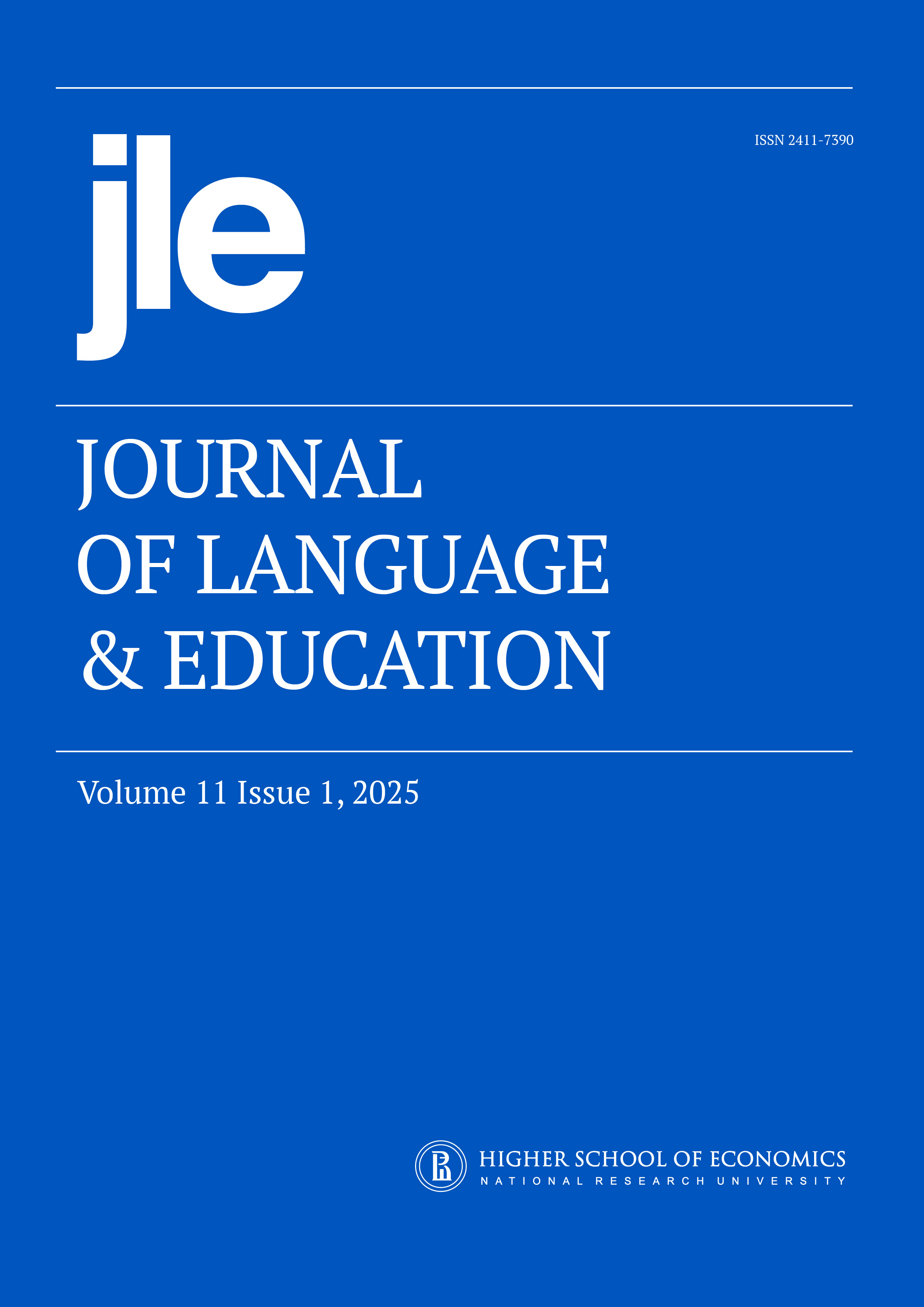The Role of Artificial Intelligence in Transforming Language Learning: Opportunities and Ethical Considerations
Аннотация
Artificial Intelligence (AI) has transformed teaching and learning across various disciplines, among them languages. AI has numerous applications in language teaching and learning, including algorithms that personalize learning for individual learners, identify and structure lessons and learning activities based on a learner’s strengths, evaluate and provide constant feedback on a learner’s progress, and simulate interactive learning environments. Such innovative tools and applications enhance both language comprehension and production skills among learners, optimizing the outcomes of language teaching and learning. However, the adaptation of AI for language learning presents some ethical challenges related to data privacy, bias in the development and training of algorithms, and the lack of universality in access and usage of AI, which threatens to widen the already extensive inequalities in education. This article explores these dimensions of the application of AI in language learning and teaching with the overarching goal of fostering a more informed and ethical approach to the integration of AI and related technologies in language education.
Скачивания
Литература
Akgun, S., & Greenhow, C. (2022). Artificial intelligence in education: Addressing ethical challenges in K-12 settings. AI and Ethics, 2(3), 431-440. https://doi.org/10.1007%2Fs43681-021-00096-7
Alajlani, N., Crabb, M., & Murray, I. (2023). A systematic review in understanding stakeholders’ role in developing adaptive learning systems. Journal of Computers in Education, 1-20. https://doi.org/10.1007/s40692-023-00283-x
Ali, Z. (2020, February). Artificial intelligence (AI): A review of its uses in language teaching and learning. IOP Conference Series: Materials Science and Engineering, 769(1), 012043. https://doi.org/10.1088/1757-899X%2F769%2F1%2F012043
Ali, O., Murray, P. A., Momin, M., Dwivedi, Y. K., & Malik, T. (2024). The effects of artificial intelligence applications in educational settings: Challenges and strategies. Technological Forecasting and Social Change, 199, 123076. https://doi.org/10.1016/j.techfore.2023.123076
Bentley, S. V., Naughtin, C. K., McGrath, M. J., Irons, J. L., & Cooper, P. S. (2024). The digital divide in action: How experiences of digital technology shape future relationships with artificial intelligence. AI and Ethics, 4, 901-915. https://doi.org/10.1007/s43681-024-00452-3
Chichekian, T., & Benteux, B. (2022). The potential of learning with (and not from) artificial intelligence in education. Frontiers in Artificial Intelligence, 5, 903051. https://doi.org/10.3389/frai.2022.903051
Contrino, M. F., Reyes-Millán, M., Vázquez-Villegas, P., & Membrillo-Hernández, J. (2024). Using an adaptive learning tool to improve student performance and satisfaction in online and face-to-face education for a more personalized approach. Smart Learning Environments, 11(1), 6. https://doi.org/10.1186/s40561-024-00292-y
De la Vall, R. R. F., & Araya, F. G. (2023). Exploring the benefits and challenges of AI-language learning tools. International Journal of Social Sciences and Humanities Invention, 10(01), 7569-7576. https://doi.org/10.18535/ijsshi/v10i01.02
El-Sabagh, H. A. (2021). Adaptive e-learning environment based on learning styles and its impact on development students’ engagement. International Journal of Educational Technology in Higher Education, 18(1), 53. https://doi.org/10.1186/s41239-021-00289-4
Gligorea, I., Cioca, M., Oancea, R., Gorski, A. T., Gorski, H., & Tudorache, P. (2023). Adaptive learning using artificial intelligence in e-learning: a literature review. Education Sciences, 13(12), 1216. https://doi.org/10.3390/educsci13121216
González-Calatayud, V., Prendes-Espinosa, P., & Roig-Vila, R. (2021). Artificial intelligence for student assessment: A systematic review. Applied Sciences, 11(12), 5467. https://doi.org/10.3390/app11125467
Idowu, J. A. (2024). Debiasing education algorithms. International Journal of Artificial Intelligence in Education, 34, 1-31. https://doi.org/10.1007/s40593-023-00389-4
Kaur, P., Kumar, H., & Kaushal, S. (2023). Technology-assisted language learning adaptive systems: A comprehensive review. International Journal of Cognitive Computing in Engineering, 4, 301-311. https://doi.org/10.1016/j.ijcce.2023.09.002
Karan, B., & Angadi, G. R. (2023). Potential risks of artificial intelligence integration into school education: A systematic review. Bulletin of Science, Technology & Society, 43(3-4), 67-85. https://doi.org/10.1177/02704676231224705
Karasimos, A. (2022). The battle of language learning apps: A cross-platform overview. Research Papers in Language Teaching and Learning, 12(1), 150-166.
Kushmar, L. V., Vornachev, A. O., Korobova, I. O., & Kaida, N. O. (2022). Artificial Intelligence in language learning: What are we afraid of. Arab World English Journal, 8, 262–273. https://doi.org/10.24093/awej/call8.18
Liu, M. (2023). Exploring the application of artificial intelligence in foreign language teaching: Challenges and future development. SHS Web of Conferences, 168, 03025. https://doi.org/10.1051/shsconf/202316803025
Nguyen, A., Ngo, H. N., Hong, Y., Dang, B., & Nguyen, B. P. T. (2023). Ethical principles for artificial intelligence in education. Education and Information Technologies, 28(4), 4221-4241. https://doi.org/10.1007/s10639-022-11316-w
Schiff, D. (2021). Out of the laboratory and into the classroom: the future of artificial intelligence in education. AI & Society, 36(1), 331-348. https://doi.org/10.1007%2Fs00146-020-01033-8
Seo, K., Tang, J., Roll, I., Fels, S., & Yoon, D. (2021). The impact of artificial intelligence on learner–instructor interaction in online learning. International Journal of Educational Technology in Higher Education, 18, 1-23. https://doi.org/10.1186/s41239-021-00292-9
Sharadgah, T. A., & Sa’di, R. A. (2022). A systematic review of research on the use of artificial intelligence in English language teaching and learning (2015-2021): What are the current effects?. Journal of Information Technology Education: Research, 21, 331-337. https://doi.org/10.28945/4999
Song, B., & Xiong, D. (2023). A comparative study of the effects of social media and language learning apps on learners’ vocabulary performance. Asia Pacific Education Review. https://doi.org/10.1007/s12564-023-09871-z
Veras, M., Dyer, J. O., & Kairy, D. (2024). Artificial intelligence and digital divide in physiotherapy education. Cureus, 16(1), e52617.
Wei, L. (2023). Artificial intelligence in language instruction: Impact on English learning achievement, L2 motivation, and self-regulated learning. Frontiers in Psychology, 14, 1261955. https://doi.org/10.3389/fpsyg.2023.1261955
Wei-Xun, L., & Jia-Ying, Z. (2024). Impact of AI-driven language learning apps on vocabulary acquisition among English learners. Research Studies in English Language Teaching and Learning, 2(1), 1-11. https://doi.org/10.62583/rseltl.v2i1.32
Yuen, C. L., & Schlote, N. (2024). Learner experiences of mobile apps and artificial intelligence to support additional language learning in education. Journal of Educational Technology Systems, 00472395241238693. https://doi.org/10.1177/00472395241238693
Zhang, K., & Aslan, A. B. (2021). AI technologies for education: Recent research & future directions. Computers and Education: Artificial Intelligence, 2, 100025. https://doi.org/10.1016/j.caeai.2021.100025
Copyright (c) 2025 Национальный исследовательский университет «Высшая школа экономики»

Это произведение доступно по лицензии Creative Commons «Attribution» («Атрибуция») 4.0 Всемирная.
Авторы, публикующие статьи в журнале, соглашаются с условиями политики авторских прав.



